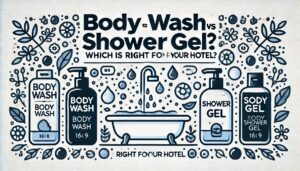
‘Body Wash vs Shower Gel_ Which is Right for Your Hotel_’.
Introduction
When it comes to daily hygiene routines, the choice between body wash and shower gel might seem trivial, but it’s a decision that can impact your skin’s health and your overall sensory experience in the shower. Both body wash and shower gel are staples in bathrooms across the globe, cherished for their refreshing qualities and myriad scents. However, despite their similar appearances and uses, they cater to different skin types and personal preferences.
Choosing the right product is not just about the allure of fragrances or the appeal of the packaging—it’s about understanding what’s best for your skin’s needs. Whether you have dry, oily, or sensitive skin, the right choice can make a significant difference in your skin’s hydration, cleanliness, and health. This guide delves into the nuances of body washes and shower gels, helping you navigate through their benefits to find the best option for your daily routine.
Understanding Body Wash
Body wash is a liquid cleanser that is used in the shower to clean the body. Unlike traditional bar soaps, body washes are typically formulated with a combination of water, detergents, and moisturizers to create a gentle cleansing solution that doesn’t strip the skin of its natural oils. This product is applied with hands, a washcloth, or a loofah to help exfoliate the skin while washing away dirt and impurities.
Key Ingredients in Body Washes
Most body washes contain several key ingredients that enhance their effectiveness and provide additional benefits:
- Surfactants: These are cleansing agents that help remove oil and dirt. Common examples include sodium laureth sulphate and cocamidopropyl betaine.
- Moisturizers: Ingredients like glycerin, oils (such as coconut oil), and shea butter are added to hydrate the skin.
- Fragrances and Essential Oils: These provide a pleasant scent and can offer aromatherapeutic benefits.
- Preservatives: These are necessary to prevent microbial growth and extend the shelf life of the product.
Benefits of Using Body Wash
Using body wash has several advantages, particularly in terms of moisturizing properties and suitability for sensitive skin types:
- Moisturizing Properties: Body washes are often enriched with moisturizers that leave the skin feeling soft and smooth. This is especially beneficial in preventing dryness and maintaining the skin’s natural moisture barrier.
- Suitability for Dry and Sensitive Skin: The gentle formula of body washes makes them ideal for dry and sensitive skin types. They cleanse without causing irritation or excessive dryness, which is crucial for maintaining healthy skin.
Incorporating a body wash into your daily routine can lead to healthier skin and a more enjoyable bathing experience, especially if you select a product tailored to your skin type and concerns.
Understanding Shower Gel
The shower gel is a popular choice for a refreshing and effective cleanse in the bath or shower. Much like body wash, it is a liquid cleanser, but it often boasts a more gel-like consistency and is designed to clean the skin thoroughly without leaving any residue. Shower gels are typically formulated to provide a rich lather, enhancing the sensory experience of your shower routine.
Key Ingredients in Shower Gels
Shower gels include a variety of ingredients that help them stand out from other bathing products:
- Surfactants: These are the cleaning agents that help foam and cleanse the skin, with sodium lauryl sulphate being a common choice for its lathering properties.
- Humectants: Ingredients like propylene glycol and glycerin attract moisture to the skin, ensuring it remains hydrated.
- Fragrances and Colorants: Shower gels are available in a range of scents and colours, contributing to a vibrant and aromatic bathing experience.
- Exfoliants: Some shower gels also include mild exfoliants like microbeads (environmentally friendly versions) or natural scrubs to help remove dead skin cells.
Benefits of Using Shower Gel
Shower gels are formulated not only to appeal to the senses but also to offer specific skin benefits:
- Deep Cleansing Capabilities: The formula of shower gels is designed to effectively dissolve grease and oil, making them excellent for deep cleansing the skin. This makes them particularly suitable for use after intense workouts or on hot days.
- Better for Oily and Combination Skin: Thanks to their deep cleansing properties, shower gels can help manage sebum production, making them a good choice for those with oily or combination skin types.
Opting for a shower gel can be particularly beneficial if you’re looking for a product that not only cleanses effectively but also helps manage oiliness and leaves your skin feeling refreshed and invigorated.
Detailed Comparison Between Body Wash and Shower Gel
When selecting your ideal bathing product, understanding the differences between body wash and shower gel can significantly influence your choice. Each offers unique characteristics tailored to various skin types and personal preferences.
Texture and Consistency
- Body Wash: Typically has a creamier texture that is smoother and sometimes thicker. This consistency is excellent for retaining moisture on the skin.
- Shower Gel: Known for its gel-like consistency, it tends to be clearer and more liquid, providing a lighter feel on the skin.
Lathering Properties
- Body Wash: Produces a rich, creamy lather, which helps moisturize and soften the skin as it cleanses.
- Shower Gel: Offers a bubbly, frothy lather that effectively removes dirt and oil, making it feel more refreshing and invigorating.
Skin Type Suitability
- Best Options for Dry Skin:
- Body Washes are generally better for dry skin due to their moisturizing ingredients that help to hydrate and soothe dry patches.
- Best Options for Oily Skin:
- Shower Gels are preferable for oily skin as their formulation helps to strip away excess oil without over-drying.
- Recommendations for Sensitive Skin:
- Both products can be formulated for sensitive skin. Look for hypoallergenic labels and those without added fragrances or harsh chemicals.
Price Comparison and Value for Money
- Body Wash: Often priced slightly higher due to the additional moisturizing ingredients which can offer better value for those with dry or sensitive skin.
- Shower Gel: This can be more economical, especially if you are looking for a product that excels in cleansing and refreshing the skin.
In terms of overall value, your choice should depend on what benefits you value most in a product—deep cleansing and a refreshing experience from shower gels or a nourishing, gentle cleanse from body washes.
Situational Use Cases
Understanding when to use body wash or shower gel can optimize your skincare routine, adapting to various situations and seasonal needs.
When to Use Body Wash
- Daily Moisturizing: Ideal for everyday use to keep skin hydrated.
- Dry Climates: Excellent in winter or dry climates to prevent skin from flaking and itching.
When to Use Shower Gel
- Post-Workout Cleansing: Effective for removing sweat and oil buildup after exercise.
- Hot Weather: Refreshing in summer or humid conditions, helping to cool down and cleanse the skin thoroughly.
Seasonal Considerations
- Winter: Body wash is preferable as it helps maintain moisture during cold, harsh weather.
- Summer: Shower gel can be more refreshing and prevent sweat-induced breakouts.
Using Products for Specific Needs
- Sensitive Skin: Opt for fragrance-free, gentle formulas in either category.
- Eczema or Acne-Prone Skin: Use products with soothing ingredients like aloe vera or tea tree oil.
Choosing Eco-Friendly and Skin-Friendly Options
The shift towards eco-friendly and skin-friendly products is not just a trend but a vital move towards sustainable and safe skin care practices.
Importance of Eco-Friendly Products
- Environmental Impact: Reduces pollution and waste, helping preserve natural resources.
- Health Benefits: Minimizes exposure to synthetic chemicals that can disrupt the body’s natural functions.
Recommendations for Natural and Organic Options
- Certified Organic Products: Look for certifications to ensure products meet strict organic standards.
- Natural Ingredients: Choose body washes and shower gels that use natural plant-based ingredients and essential oils for fragrance.
Discussion on Harmful Ingredients to Avoid
- Sulfates (SLS/SLES): Can strip skin of natural oils, leading to dryness and irritation.
- Parabens: Used as preservatives, these chemicals are linked to potential health risks and skin irritations.
- Phthalates: Often used in fragrances, these can disrupt hormonal balances and should be avoided.
By selecting products that align with eco-friendly and skin-friendly values, consumers not only protect their skin but also contribute to a healthier planet.
Expert Opinions

‘Expert Opinions’.
Gleaning insights from dermatologists and beauty experts can provide a deeper understanding of how body wash and shower gel affect skin health and how to maximize their benefits.
Insights from Dermatologists
- Skin Health Impact: Dermatologists emphasize that the choice between body wash and shower gel should consider individual skin types and issues. Body washes, often enriched with moisturizers, are recommended for dry or sensitive skin to enhance hydration, while shower gels are better for oily or acne-prone skin due to their deep cleansing properties.
- Long-Term Use: Regular use of products suited to your skin type can improve skin texture and prevent common skin problems.
Tips from Beauty Experts
- Making the Most of Your Choice: Beauty experts suggest using products with natural fragrances to enhance the sensory experience without harsh chemicals. They also recommend alternating between types based on seasonal changes and skin needs.
- Layering Products: For those who enjoy fragrances, selecting a body wash or shower gel that complements your lotion or perfume can help extend the scent’s longevity without overpowering.
Application Techniques for Optimal Results
The way you apply body wash or shower gel can significantly affect how well they perform. Using the right tools can enhance the effectiveness of these products.
Best Practices for Application
- Amount of Product: A small amount, typically the size of a quarter, is sufficient to cleanse the entire body. Overusing the product can lead to unnecessary waste and may irritate the skin.
- Temperature Considerations: Warm water helps to open pores, allowing the cleansing agents to work more effectively, but hot water can strip the skin of its natural oils.
Tools for Application: Benefits and Drawbacks
- Loofahs:
- Benefits: Increase lather and exfoliate the skin, removing dead skin cells and improving texture.
- Drawbacks: Can harbour bacteria if not dried properly and replaced regularly.
- Sponges:
- Benefits: Softer than loofahs, suitable for sensitive skin, and create a rich lather.
- Drawbacks: Like loofahs, they need regular cleaning and drying to prevent bacterial growth.
- Hands:
- Benefits: The gentlest method, good for extremely sensitive skin. It allows more control over the amount of product used.
- Drawbacks: May not exfoliate as effectively as loofahs or sponges.
Each tool has its place depending on your skin’s needs and personal preferences. Choosing the right application method can enhance your shower experience and contribute to healthier skin.
Impact on Skin’s pH Balance
The pH level of skincare products, including body wash and shower gel, plays a critical role in maintaining skin health. The skin’s natural pH is slightly acidic, typically around 5.5, which helps to protect against harmful microbes and preserve skin integrity.
How pH Affects Skin Health
- Disruption of Skin Barrier: Products that are too alkaline can disrupt the skin’s natural barrier, leading to dryness, irritation, and increased susceptibility to bacteria and infection.
- Optimal pH Products: Using body wash and shower gel with a pH close to that of the skin can help maintain its balance and overall health.
Recommendations for pH-Balanced Products
- pH-Balanced Labels: Look for products that specifically state they are “pH-balanced” to ensure they are close to the skin’s natural pH.
- Sensitive Skin Formulas: These are typically formulated to be gentler and closer to the skin’s natural pH, minimizing potential irritation.
Fragrance and Allergenic Considerations
Fragrances in body washes and shower gels can transform a routine shower into a luxurious sensory experience. However, they can also pose risks for those with sensitive skin or allergies.
Role of Fragrances
- Enhancing Experience: Fragrances can improve mood and create a pleasant shower experience.
- Potential Irritants: For some individuals, synthetic fragrances can cause allergic reactions or skin irritations.
Choosing Hypoallergenic Products
- Fragrance-Free Options: Opt for products labelled as “fragrance-free” to avoid the most common allergens found in scented products.
- Natural and Organic Fragrances: Products using essential oils instead of synthetic fragrances can sometimes be less irritating, though essential oils can also trigger allergies for some people.
Tips for Avoiding Irritations
- Patch Testing: Always perform a patch test with a new product to see how your skin reacts before using it regularly.
- Consulting Dermatologists: If you have highly sensitive skin, consulting with a dermatologist to recommend specific products can be beneficial.
The Role of Preservatives and Parabens
Preservatives are crucial ingredients in body washes and shower gels, ensuring these products remain safe and effective during their shelf life. However, the use of certain preservatives, particularly parabens, has sparked considerable debate.
Why Preservatives Are Used
- Prevent Bacterial Growth: Preservatives inhibit the growth of bacteria, mould, and yeast, which can contaminate products and pose health risks.
- Extend Shelf Life: They help maintain product integrity and effectiveness over time, ensuring that the body wash or shower gel remains safe to use from the first use to the last.
The Controversy Around Parabens
- Health Concerns: Parabens have been scrutinized for their potential links to health issues, including hormonal disruptions and increased risk of cancer, although research remains inconclusive.
- Consumer Awareness: Increased consumer awareness has led to a demand for paraben-free products, influencing manufacturers to reconsider their formulations.
Alternatives to Parabens
- Natural Preservatives: Some brands have turned to natural preservatives, such as grapefruit seed extract and vitamin E, though these can vary in effectiveness.
- Paraben-Free Labels: Products labelled as paraben-free often use alternative chemical preservatives that may be perceived as safer by consumers.
Innovations in Body Wash and Shower Gel Formulations
The body wash and shower gel market is constantly evolving, with new technologies and trends shaping consumer choices and manufacturing practices.
Recent Technological Advancements
- Enhanced Moisturizing Technologies: Innovations such as encapsulated moisturizing agents release hydration gradually, improving skin moisture retention long after the shower.
- Targeted Cleansing Formulas: Advanced surfactants provide effective cleansing that is tailored for different skin types and concerns, from ultra-sensitive to very oily skin.
Emerging Trends
- Microbead-Free Products: Following environmental concerns, the industry has moved away from plastic microbeads. Alternatives include natural exfoliants like walnut shells and jojoba beads.
- Environmental Impact: The shift away from microbeads reflects a broader trend towards environmentally friendly personal care products, including biodegradable formulas and sustainable packaging solutions.
DIY Body Wash and Shower Gel Recipes
Creating your body wash and shower gel at home allows for customization and control over ingredients, ensuring you know exactly what’s going on in your skin. Here are simple recipes and benefits of DIY options.
Simple Recipes
- Basic DIY Body Wash:
- 1/2 cup liquid castile soap
- 1/4 cup honey (for its antibacterial properties)
- 1/4 cup coconut oil (moisturizes and softens skin)
- Essential oils (like lavender or peppermint for fragrance)
- Mix all ingredients until fully blended and store in a pump bottle.
- Refreshing DIY Shower Gel:
- 1 cup distilled water
- 1/2 cup aloe vera gel (soothes the skin)
- 1/4 cup liquid castile soap
- Vitamin E oil (a natural preservative)
- Essential oils for scent
- Combine all ingredients gently to maintain a gel consistency and store in a squeeze bottle.
Benefits of DIY Options
- Customization: Adjust formulas to suit personal preferences and skin needs.
- Control Over Ingredients: Avoid harmful chemicals and allergens, choosing natural and organic components.
- Cost-Effectiveness: Often cheaper in the long run compared to store-bought options.
- Eco-Friendly: Reduce plastic waste with reusable containers.
Legal and Safety Standards in Different Regions
Understanding the legal and safety standards for body wash and shower gel products in major markets can help consumers make informed decisions.
Overview of Regulations
- European Union (EU):
- Strict regulations under the EU Cosmetic Regulation, require all personal care products to be safe, with a detailed list of banned substances.
- Mandatory safety assessments and compliance with Good Manufacturing Practices (GMP).
- United States (USA):
- Governed by the FDA under the Federal Food, Drug, and Cosmetic Act, though regulations are less stringent than in the EU.
- Manufacturers are responsible for ensuring safety, but products do not need FDA approval before going to market.
Impact on Product Safety and Quality
- Enhanced Consumer Safety: Regulations ensure that products meet stringent safety standards, protecting consumers from harmful substances.
- Quality Assurance: Compliance with these regulations guarantees that products sold have been thoroughly tested and verified for quality.
Future Trends in the Body Wash and Shower Gel Market

‘Future Trends in the Body Wash and Shower Gel Market’.
The body wash and shower gel market is dynamic, with evolving consumer preferences heavily influencing product innovation. As we look ahead, several trends are poised to shape the future of personal care.
Predictions on Consumer Preferences
- Increased Demand for Natural Ingredients: Consumers are becoming more health-conscious and environmentally aware, driving demand for products with organic, sustainable ingredients.
- Customization and Personalization: Advances in technology may allow consumers to customize body wash and shower gel products to their specific skin needs and scent preferences directly from their smartphones or computers.
Potential Future Innovations
- Eco-Friendly Packaging: As sustainability becomes more critical, innovations in biodegradable and refillable packaging options are likely to become more prevalent.
- Smart Dispensers: Technology that can adjust the chemical composition of a shower gel or body wash in real-time to suit the user’s current skin condition, or even the day’s weather, could revolutionize the market.
- Enhanced Formulations: New scientific developments may lead to more advanced formulations that offer better skin benefits, such as anti-aging properties or improved hydration, tailored to different skin types.
Call to Action
Choosing the right body wash or shower gel is about more than just pleasant fragrances; it’s about understanding and catering to your skin’s unique needs. As you explore the variety of products available, consider the following:
- Know Your Skin Type: Whether it’s dry, oily, sensitive, or a combination, understanding your skin type will help you choose products that enhance your skin’s health.
- Evaluate Ingredients: Be mindful of the ingredients in your chosen body wash or shower gel, opting for those that nourish and protect your skin.
We invite you to share your experiences and preferences in the comments below. Have you found a product that works wonders for your skin type? Or perhaps you’ve tried creating your formulations at home? Let us know what you think and what you’d like to see more of in the future.
Conclusion
Throughout this guide, we’ve explored the nuanced differences between body wash and shower gel, delving into their compositions, benefits, and the various situational uses that might make one more suitable than the other. From the creamy, moisturizing properties of body wash that are ideal for dry and sensitive skin, to the refreshing, deep-cleansing nature of shower gel perfect for oily skin and post-exercise routines, each product serves distinct purposes.
We also discussed the importance of considering the pH levels, fragrances, and ingredients of these products to ensure they meet your health standards and environmental values. Additionally, insights into DIY recipes and the latest market trends provided a glimpse into how you can take more control over what you apply to your skin and anticipate future developments in skincare.
As you navigate the array of choices available, remember the importance of selecting a product that not only cleanses effectively but also complements your skin type and lifestyle needs. Whether you lean towards the luxurious lather of shower gels or the rich, nourishing consistency of body washes, the best choice is the one that aligns with your personal preferences and contributes to your overall skin health.
We encourage you to reflect on the information shared, consider how these products fit into your daily routine, and make a choice that feels right for you. Don’t hesitate to experiment with different products and formulations to discover what truly works for your skin. Your feedback and experiences are invaluable—feel free to share them in the comments to help others in their journey towards finding the perfect product.










